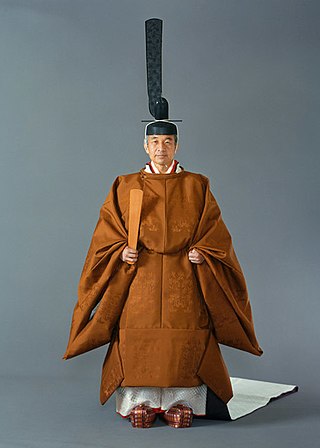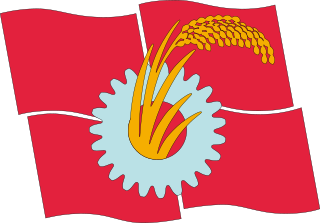Sources
- Japan Election coverage (in Japanese)
Wakayama Prefecture held a gubernatorial election on December 17, 2006.
| Party | Candidate | Votes | % | ±% | |
|---|---|---|---|---|---|
| LDP, Komeito | Yoshinobu Nisaka | 195,713 | |||
| JCP | Toshitaka Izumi | 90,665 | |||
| Turnout | 35.21% | ||||

Franklin Delano Roosevelt, also known as FDR, was the 32nd president of the United States, serving from 1933 until his death in 1945. He is the longest-serving U.S. president, and the only one to have served more than two terms. His initial two terms were centered on combating the Great Depression, while his third and fourth saw him shift his focus to America's involvement in World War II.

The politics of Japan are conducted in a framework of a dominant-party bicameral parliamentary representative democratic constitutional monarchy. A hereditary monarch, currently Emperor Naruhito, serves as head of state while the Prime Minister of Japan, currently Shigeru Ishiba since 2024, serves as the elected head of government.

Hokkaido is the second-largest island of Japan and comprises the largest and northernmost prefecture, making up its own region. The Tsugaru Strait separates Hokkaidō from Honshu; the two islands are connected by railway via the undersea Seikan Tunnel.

The National Diet is the national legislature of Japan. It is composed of a lower house, called the House of Representatives, and an upper house, the House of Councillors. Both houses are directly elected under a parallel voting system. In addition to passing laws, the Diet is formally responsible for nominating the prime minister. The Diet was first established as the Imperial Diet in 1890 under the Meiji Constitution, and took its current form in 1947 upon the adoption of the post-war constitution. Both houses meet in the National Diet Building in Nagatachō, Chiyoda, Tokyo.

The Liberal Democratic Party, frequently abbreviated to LDP or Jimintō (自民党), is a major conservative and nationalist political party in Japan. Since its foundation in 1955, the LDP has been in power almost continuously—a period called the 1955 System—except between 1993 and 1994, and again from 2009 to 2012.

The Heisei era was the period of Japanese history corresponding to the reign of Emperor Emeritus Akihito from 8 January 1989 until his abdication on 30 April 2019. The Heisei era started on 8 January 1989, the day after the death of the Emperor Hirohito, when his son, Akihito, acceded to the throne as the 125th Emperor. In accordance with Japanese customs, Hirohito was posthumously renamed "Emperor Shōwa" on 31 January 1989.

The House of Representatives is the lower house of the National Diet of Japan. The House of Councillors is the upper house. The composition of the House is established by Article 41 and Article 42 of the Constitution of Japan. The House of Representatives has 465 members, elected for a four-year term. Of these, 176 members are elected from 11 multi-member constituencies by a party-list system of proportional representation, and 289 are elected from single-member constituencies.

The House of Councillors is the upper house of the National Diet of Japan. The House of Representatives is the lower house. The House of Councillors is the successor to the pre-war House of Peers. If the two houses disagree on matters of the budget, treaties, or the nomination of the prime minister, the House of Representatives can insist on its decision. In other decisions, the House of Representatives can override a vote of the House of Councillors only by a two-thirds majority of members present.

The Democratic Party of Japan was a centrist to centre-left, liberal or social-liberal political party in Japan from 1998 to 2016.

The Japanese Communist Party is a communist party in Japan. Founded in 1922, it is the oldest political party in the country. It has 250,000 members as of January 2024, making it one of the largest non-governing communist parties in the world. The party is chaired by Tomoko Tamura, who replaced longtime leader Kazuo Shii in January 2024.

The Social Democratic Party is a political party in Japan that was established in 1996. Since its reformation and name change in 1996, it has advocated pacifism and defined itself as a social-democratic party. It was previously known as the Japan Socialist Party.

Mazie Keiko Hirono is an American lawyer and politician serving since 2013 as the junior United States senator from Hawaii. A member of the Democratic Party, Hirono previously served as a member of the United States House of Representatives for Hawaii's 2nd congressional district from 2007 to 2013. Hirono also served as a member of the Hawaii House of Representatives from 1981 to 1994 and as Hawaii's tenth lieutenant governor from 1994 to 2002 under Ben Cayetano. She was the Democratic nominee for governor of Hawaii in 2002, but lost to Republican Linda Lingle.

The Japanese political process has two types of elections.

Shinzo Abe was a Japanese politician who served as the prime minister of Japan and president of the Liberal Democratic Party (LDP) from 2006 to 2007 and again from 2012 to 2020. He was the longest-serving prime minister in Japanese history, serving for almost nine years in total.

General elections were held in Japan on August 30, 2009 to elect the 480 members of the House of Representatives. The opposition Democratic Party of Japan (DPJ) defeated the ruling coalition in a landslide, winning 221 of the 300 constituency seats and receiving 42.4% of the proportional block votes for another 87 seats, a total of 308 seats to only 119 for the LDP.

General elections were held in Japan on 16 December 2012. Voters gave the Liberal Democratic Party a landslide victory, ejecting the Democratic Party from power after three years. It was the fourth worst defeat suffered by a ruling party in Japanese history.

General elections were held in Japan on 14 December 2014. Voting took place in all Representatives constituencies of Japan including proportional blocks to elect the members of the House of Representatives, the lower house of the National Diet of Japan. As the cabinet resigns in the first post-election Diet session after a general House of Representatives election, the lower house election also led to a new election of the prime minister in the Diet, won by incumbent Shinzō Abe, and the appointment of a new cabinet. The voter turnout in this election remains the lowest in Japanese history.

General elections were held in Japan on 22 October 2017. Voting took place in all Representatives constituencies of Japan – 289 single-member districts and eleven proportional blocks – in order to appoint all 465 members of the House of Representatives, the lower house of the then 707-member bicameral National Diet of Japan. Incumbent Prime Minister Shinzō Abe's governing coalition of the Liberal Democratic Party (LDP) and the Komeito party retained their seats in signs of what was perceived as weak opposition. Abe won his fourth term in office and held on to the two-thirds supermajority in order to implement policies on revising the war-renouncing Article 9 of the Japanese Constitution.

General elections were held in Japan on 31 October 2021, as required by the constitution. Voting took place in all constituencies in order to elect members to the House of Representatives, the lower house of the National Diet. As the constitution requires the cabinet to resign in the first Diet session after a general election, the elections will also lead to a new election for Prime Minister in the Diet, and the appointment of a new cabinet, although ministers may be re-appointed. The election was the first general election of the Reiwa era.

The Constitutional Democratic Party of Japan is a liberal political party in Japan. It is the primary centre-left party in Japan, and as of 2024 is the second largest party in the National Diet behind the ruling Liberal Democratic Party (LDP).